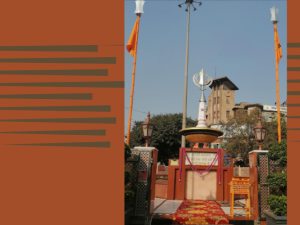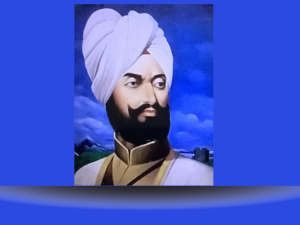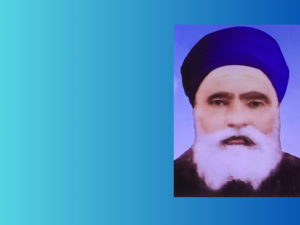BHAI MANI SINGH
Bhai Mani Singh (1655–1705) was a distinguished Punjabi poet and a prominent figure in the Sikh tradition, whose literary contributions and historical significance extend beyond mere poetic achievement. He was a contemporary of Guru Gobind Singh, the tenth Sikh Guru, and his work reflects the socio-religious milieu of 17th-century Punjab, a period marked by intense religious and political upheaval. Bhai Mani Singh was born in a family of Sikh devotees in the village of Alipur, near Lahore. His early exposure to the teachings of Sikhism profoundly influenced his literary output. His education and literary prowess were nurtured under the guidance of prominent Sikh scholars and saints, fostering his role as a key figure in the Sikh literary tradition.
Bhai Mani Singh is primarily known for his role as a compiler and editor of the Sikh scripture, the Guru Granth Sahib. His scholarly work in transcribing and organizing the hymns of the Sikh Gurus into a cohesive and accessible format was instrumental in preserving and promoting Sikh theology. His meticulous efforts ensured that the Guru Granth Sahib became the central text of Sikhism, solidifying its place in the religious and cultural life of the Sikh community.
As a poet, Bhai Mani Singh's contributions are closely intertwined with his devotional practice. His poetry, largely composed in Punjabi, reflects the spiritual fervor and devotion characteristic of Sikhism. His hymns and verses are notable for their profound engagement with the themes of divine love, devotion, and the socio-political struggles of his time. His literary works often employed a blend of Punjabi vernacular and classical poetic forms, making them accessible to a broad audience while preserving the depth of Sikh philosophical thought. Bhai Mani Singh's impact extends beyond his literary achievements. His unwavering commitment to Sikh principles and his role in the Sikh community during a tumultuous period in Punjab's history underscore his significance. His martyrdom in 1705, following his refusal to convert to Islam and his steadfast adherence to Sikh principles, cemented his status as a revered figure in Sikh history. His life and sacrifices continue to inspire reverence and respect within the Sikh community.
Bhai Mani Singh's legacy is multifaceted, encompassing his contributions to Sikh literature, his role in the preservation of Sikh scriptures, and his embodiment of Sikh ideals in his personal life. His poetic and editorial works remain influential in Sikh devotional practices and continue to be studied for their literary and theological depth. His life and work offer valuable insights into the intersection of religion, literature, and history in the Sikh tradition. Bhai Mani Singh's contributions as a poet and scholar have left an indelible mark on Sikh literature and religious practice. His efforts in preserving and transmitting Sikh teachings through his editorial work, combined with his poetic expressions of devotion, highlight his integral role in the development of Sikh religious and cultural identity.
ABDUL HAQ DARD
Abdul Haq, also known as Abdul Haq Dard (1551-1642), was a prominent Punjabi poet renowned for his significant contributions to Punjabi literature during the 16th and early 17th centuries. His literary output is noteworthy for its depth, thematic variety, and linguistic innovation. Abdul Haq was born in the region that is now Punjab, and his life spanned a period of significant political and cultural change in South Asia. His work emerged during the Mughal Empire, a time characterized by a confluence of Persian, Sanskrit, and local vernacular traditions. This cultural milieu profoundly influenced his poetry, leading to a unique blend of Persian literary forms with native Punjabi expressions.
A defining characteristic of Abdul Haq’s poetry is its use of the Punjabi language in ways that enriched its literary tradition. His compositions primarily consist of ghazals and other forms of lyrical poetry, which exhibit a deep understanding of Sufi mysticism. His poetry often explores themes of divine love, spiritual longing, and existential reflection. Abdul Haq’s work reflects the Sufi emphasis on personal experience and the quest for spiritual enlightenment, a common thread in the broader Persianate literary tradition of the time. Abdul Haq’s literary style is marked by its eloquence and emotional resonance. He employed a range of poetic devices, including metaphors, similes, and intricate imagery, to convey profound spiritual truths and personal sentiments. His use of vernacular Punjabi, alongside classical Persian and Arabic influences, helped to elevate Punjabi as a literary language and provided a rich linguistic framework for future generations of poets.
The impact of Abdul Haq on Punjabi literature can be seen in his influence on subsequent poets and literary figures. His work served as a bridge between the classical Persian literary tradition and the burgeoning vernacular literature of the Punjab region. His contributions helped lay the groundwork for the development of modern Punjabi poetry and have been acknowledged in the broader context of South Asian literary history. Abdul Haq Dard’s poetry is a significant testament to the cultural and linguistic syncretism of his time. His ability to fuse Persian literary traditions with Punjabi vernacular forms not only enriched the Punjabi literary heritage but also underscored the dynamic interplay between regional and classical literary traditions in early modern South Asia.
SHAH SHARAF
Shah Sharaf (1577-1662), an eminent Punjabi poet from the late 16th to the mid-17th century, occupies a significant place in the literary and cultural history of Punjab. Born in 1577 in the region that is now part of Pakistan, his poetic oeuvre is renowned for its profound spiritual and mystical themes, reflective of the broader Sufi traditions of the time. Shah Sharaf's poetry is characterized by its deep mystical insight and its alignment with the Sufi philosophy of divine love and union with the Absolute. His works predominantly consist of kafis and qawwalis, which are forms of lyrical poetry that express longing for the divine, spiritual introspection, and ethical exhortations. His verse is imbued with rich imagery and symbolism, often drawing from the natural world to articulate complex spiritual experiences and concepts.
One of the key features of Shah Sharaf's poetry is its emphasis on the experiential dimension of spirituality, as opposed to mere ritualistic or doctrinal aspects. His verses frequently explore the themes of existential angst, divine love, and the human quest for spiritual fulfillment. This reflective and emotive quality renders his poetry accessible and resonant with a broad audience, transcending the strict boundaries of religious and linguistic identity. Shah Sharaf's contribution to Punjabi literature extends beyond his poetic prowess; his works have had a lasting influence on the development of Punjabi Sufi poetry. His integration of local linguistic and cultural elements into the broader Sufi poetic tradition enriched the literary heritage of the Punjab region. His writings not only reflect the syncretic cultural milieu of the time but also contributed to the preservation and enrichment of the Punjabi language. Despite the passage of centuries, Shah Sharaf's poetry continues to be celebrated for its spiritual depth and lyrical beauty. His works remain a vital part of the study of Punjabi literature and Sufi poetry, illustrating the enduring power of mystical expression and its impact on cultural and spiritual life.
ALI HAIDER MULTANI
Ali Haider Multani (1693–1772) was a significant figure in the literary and cultural history of Punjab. His contributions as a poet in the Punjabi language have left a lasting impact on the region's literary traditions. Multani's work is notable for its deep engagement with the socio-political and cultural milieu of his time, reflecting both the complexities and the vibrancy of 18th-century Punjab.
Multani was born in Multan, a city with a rich historical legacy, which influenced his literary output. His poetry, predominantly in Punjabi, reflects a confluence of regional and Persian influences, showcasing a unique synthesis of local vernacular and classical forms. This blend underscores the dynamic cultural exchanges in Punjab during the Mughal era and the subsequent rise of regional powers. His oeuvre primarily includes ghazals, a poetic form that he adapted to express the spiritual and existential concerns of his era. Multani's ghazals are characterized by their intricate use of metaphors and symbolism, often drawing on Sufi themes of divine love and mysticism. This reflects a broader trend in Punjabi literature where Sufi poets sought to convey complex spiritual ideas through the accessible and emotive medium of poetry.
Multani's work is also significant for its socio-political commentary. He lived through a period of considerable upheaval, marked by the decline of Mughal authority and the rise of Sikh and regional powers. His poetry often addresses the tensions and transformations of this period, providing a lens through which contemporary readers can understand the socio-political landscape of 18th-century Punjab. His engagement with themes such as justice, governance, and social equity demonstrates his awareness of the changing power dynamics and his concern for societal well-being. Moreover, Ali Haider Multani's influence extends beyond his lifetime. His poetry contributed to the development of Punjabi literary traditions and served as a precursor to later literary movements in the region. His work has been studied for its artistic merit and its reflection of the historical and cultural conditions of his time, making him a key figure in the study of Punjabi literature and history.Ali Haider Multani stands out as a pivotal figure in Punjabi literary history. His poetry not only exemplifies the artistic achievements of his era but also provides valuable insights into the historical and cultural contexts of 18th-century Punjab. His legacy continues to be a subject of scholarly interest, contributing to our understanding of the region's literary and cultural heritage.
BHAI BIR SINGH Bhai Bir Singh, an eminent Punjabi poet, is renowned for his literary contributions, particularly his more than 260 Years chronicle that extols the valor and achievements of Sri Guru Gobind Singh Ji. His work, which emerged around 1760-1770, stands as a prime example of Bir Rasa—a poetic style characterized by its portrayal of heroism and martial prowess. This chronicle not only celebrates the life and struggles of the Tenth Sikh Guru but also provides a vivid portrayal of the socio-political landscape of the time.
The Baramaha is noteworthy for its detailed recounting of historical events such as the wars with the Pathans and the Durrani invasions, highlighting the intense conflicts faced by the Khalsa. Bhai Bir Singh's poetry reflects a deep engagement with the historical and religious context, capturing both the physical and spiritual dimensions of the Sikh experience during that period.
A distinctive feature of his work is the recurring poetic motif found in the concluding verses of each month, where the poet expresses a longing for the divine vision of Sri Amritsar Ji, suggesting that the work might have been composed during a pilgrimage or a period of devotional reflection. This longing is captured in the lines: “Ful Hari Ki Har Ji Hain, Darshan Amritsar Ji han, Mera Mana Lochada,” which translates to a deep yearning for the divine sight and a reflection on spiritual aspiration.
In addition to his Punjabi verses, Bhai Bir Singh's Baramaha includes elements in Hindi and Persian, showcasing his versatility and his ability to intertwine different literary traditions. His work incorporates vivid imagery and metaphors related to weapons and combat, demonstrating a sophisticated command of language and a keen sense of martial ethos. The incorporation of such elements aligns with the poetic traditions of Dabir and Anis, highlighting his engagement with broader literary currents. Bhai Bir Singh's contributions are significant in the context of Punjabi literature and Sikh historiography. His work provides valuable insights into the historical context of the Sikh Gurus, the cultural milieu of the 18th century, and the literary traditions of the time.
DARERA
Darera (1784-1863) occupies a significant place in the landscape of Punjabi poetry, known for his contributions during a period of rich literary and cultural flourishing in Punjab. His life and works reflect the socio-political dynamics of the late 18th and early 19th centuries, a time marked by the waning of Mughal influence and the rise of Sikh power under Maharaja Ranjit Singh. Born in 1784, Darera's lifetime spanned a period of profound transformation in Punjab. This era saw the decline of the Mughal Empire, the consolidation of Sikh states, and the eventual establishment of the Sikh Empire under Ranjit Singh. The literary scene was vibrant, with poets and scholars drawing from a diverse array of influences, including Persian, Arabic, and indigenous traditions.
Darera’s poetry is characterized by its deep spiritual and philosophical themes. His works often explore the human condition, divine love, and the quest for spiritual enlightenment. He was part of a tradition that saw poetry not just as a form of artistic expression but as a means of imparting moral and spiritual wisdom. One of the hallmarks of Darera’s poetry is his adept use of the Punjabi language, which he employed with great dexterity to convey complex philosophical ideas. His verses are known for their lyrical quality, combining simplicity with profound depth. This made his poetry accessible to the common people, resonating with their everyday experiences while elevating their spiritual consciousness. Darera's themes often revolved around the ephemeral nature of life, the importance of devotion, and the inner journey towards self-realization. His style, while deeply rooted in the classical traditions of Punjabi poetry, also exhibited a unique voice that distinguished his work from his contemporaries. His poetry is often marked by a mystical tone, reflecting the influence of Sufism and Bhakti movements. This blending of Islamic and Hindu spiritual philosophies is a defining feature of his work, embodying the syncretic culture of Punjab.
Darera's influence extended beyond his immediate circle of followers. His works contributed to the larger corpus of Punjabi literature, inspiring subsequent generations of poets and writers. His ability to weave together different cultural and spiritual strands helped to foster a sense of shared identity among the diverse populace of Punjab. His legacy is preserved in the oral and written traditions of Punjabi literature, with his poetry continuing to be recited and studied. Scholars and literary enthusiasts recognize Darera for his role in enriching Punjabi literary heritage, highlighting his contribution to the spiritual and cultural discourse of his time. Darera's poetry remains a testament to the rich literary tradition of Punjab. His works offer valuable insights into the spiritual and philosophical currents of his era, reflecting a unique blend of cultural influences. As a poet, Darera not only contributed to the literary canon but also played a significant role in shaping the spiritual and cultural ethos of his community. His legacy endures, continuing to inspire and enlighten readers and scholars alike.
FAZAL SHAH
Fazal Shah (1784-1863) is a significant figure in the annals of Punjabi literature, renowned for his poetic contributions during a transformative period in the history of Punjab. His work reflects the rich tapestry of cultural, social, and political changes occurring in the region during the late 18th and early 19th centuries. Fazal Shah was born at a time when the Mughal Empire's influence was declining, and the Sikh Empire under Maharaja Ranjit Singh was rising. This era was marked by cultural syncretism, political upheaval, and a burgeoning sense of regional identity. The literary scene in Punjab was dynamic, with poets drawing inspiration from various traditions, including Persian, Arabic, and local folklore.
Fazal Shah’s poetry is noted for its spiritual depth, lyrical beauty, and profound philosophical insights. His works often delve into themes of divine love, human suffering, and the quest for spiritual enlightenment. He adeptly used the Punjabi language to express complex ideas, making his poetry both accessible and deeply moving. His mastery of language and his ability to infuse his poetry with emotional and intellectual richness earned him a prominent place among Punjabi poets. Fazal Shah's verses are characterized by their clarity, elegance, and evocative imagery, which resonate with readers across generations. The central themes of Fazal Shah’s poetry include the transient nature of life, the pursuit of truth, and the importance of spiritual devotion. His style blends simplicity with profundity, allowing him to communicate intricate spiritual and philosophical concepts in a manner that was relatable to his audience.
Fazal Shah was influenced by the Sufi and Bhakti traditions, which emphasized inner piety and devotion over ritualistic practices. His poetry often reflects a mystical outlook, celebrating the unity of existence and the omnipresence of the divine. This syncretic approach is a hallmark of Punjabi literature, bridging diverse religious and cultural perspectives. Fazal Shah’s influence on Punjabi literature is profound. His works have inspired countless poets and writers, contributing significantly to the region's literary heritage. His ability to harmonize different cultural and spiritual elements helped foster a sense of unity and shared identity among the people of Punjab. His poetry continues to be studied and recited, preserving his legacy and ensuring that his contributions to Punjabi literature are not forgotten. Fazal Shah's work offers invaluable insights into the spiritual and cultural life of his time, making him an enduring figure in the literary landscape of Punjab. Fazal Shah stands out as a beacon of Punjabi literary tradition. His poetry encapsulates the spiritual quest and cultural richness of his era, offering a unique blend of artistic expression and philosophical depth. As a poet, Fazal Shah not only enriched the literary canon but also played a crucial role in shaping the spiritual and cultural ethos of Punjab. His enduring legacy continues to inspire and enlighten, highlighting the timeless relevance of his poetic contributions.
BABA HAKAM SINGH
Baba Hakam Singh, a notable figure in Punjabi literature, emerged during a period rich in religious and cultural transformation in the Indian subcontinent. His contributions are particularly significant in the context of Sikh religious poetry and its evolution. Baba Hakam Singh, active primarily during the 17th century, is renowned for his deep engagement with Sikhism, which is reflected in his poetic works. His poetry is characterized by its devotional fervor and philosophical depth, addressing themes of divine love, spirituality, and moral conduct. Singh’s verses often resonate with the teachings of the Sikh Gurus, particularly those of Guru Nanak and Guru Arjan Dev, integrating the principles of Sikhism into a personal and devotional poetic expression. His work is situated within the broader tradition of Punjabi Sufi and Bhakti poetry, yet it distinctly reflects Sikh theological perspectives. Singh's poetry exemplifies the synthesis of local cultural elements with Sikh religious thought, contributing to the vernacularization of spiritual concepts and making them accessible to a broader audience.
The language of Baba Hakam Singh’s poetry is notable for its rich, idiomatic Punjabi, which not only underscores his deep cultural roots but also enhances the emotive and rhetorical power of his spiritual messages. His use of allegory and metaphor in depicting the divine and the human condition demonstrates a sophisticated grasp of poetic form and spiritual insight.While historical records about Baba Hakam Singh are somewhat sparse compared to other prominent figures of Sikh literature, his works remain a testament to the vibrant and evolving nature of Punjabi devotional literature. Scholars interested in Sikh literature and Punjabi poetry often examine his contributions to understand the regional variations of Sikh devotional expression and the integration of local linguistic and cultural practices into the broader framework of Sikh spirituality. Baba Hakam Singh stands as a significant poet whose works reflect the intersection of Sikh devotionalism and Punjabi cultural expressions. His contributions provide valuable insights into the spiritual and literary landscape of 17th-century Punjab, enriching the broader tapestry of South Asian devotional literature.
BHAI VIR SINGH
Bhai Vir Singh (1872-1957) is a towering figure in Punjabi literature and one of the most influential poets of the early 20th century. His contributions to Punjabi poetry, literature, and the broader cultural landscape of Punjab are immense, earning him the title of the "Father of Modern Punjabi Literature." Bhai Vir Singh was born into a family deeply rooted in the Sikh tradition. His lifetime spanned a period of significant socio-political changes, including British colonial rule in India and the Indian independence movement. These changes influenced his writings, which often reflect a deep engagement with issues of identity, spirituality, and social reform. Bhai Vir Singh’s contributions to Punjabi literature are diverse, encompassing poetry, prose, and scholarship. His poetry is particularly notable for its lyrical beauty, spiritual depth, and innovative use of language. He was a pioneer in modernizing Punjabi poetry, moving away from traditional forms and themes to explore new subjects and styles.
His major poetic works include "Rana Surat Singh," an epic poem that intertwines themes of heroism, love, and spirituality, and "Matak Hulare," a collection of devotional poems. These works not only enriched Punjabi literary tradition but also played a crucial role in the revival of Sikh heritage and culture.Bhai Vir Singh's poetry is characterized by its spiritual intensity and profound humanism. His themes often revolve around divine love, the beauty of nature, and the quest for inner purity. His works reflect a deep engagement with Sikh philosophy and spirituality, drawing from the teachings of Guru Granth Sahib.His style is marked by its simplicity and elegance, making complex spiritual ideas accessible to a broader audience. Bhai Vir Singh’s use of vivid imagery and metaphors brings his poetry to life, engaging readers and evoking deep emotional responses.Bhai Vir Singh’s influence on Punjabi literature and culture is vast. He was instrumental in the literary renaissance of the Punjabi language, advocating for its use in education and literature at a time when it was marginalized by colonial policies. His efforts helped establish Punjabi as a respected literary language, encouraging a new generation of writers and poets.
He also founded several literary and cultural institutions, including the Khalsa Tract Society and the Chief Khalsa Diwan, which played crucial roles in promoting Punjabi literature and Sikh culture. His scholarly works on Sikh history and religion further cemented his legacy as a key figure in the intellectual and cultural life of Punjab.
Bhai Vir Singh was widely recognized for his contributions to literature and culture. He received numerous awards and honors, including the Sahitya Akademi Award in 1955 and Padam Bhushan in 1956. His legacy continues to be celebrated, with numerous institutions and awards named in his honor.Bhai Vir Singh's contributions to Punjabi poetry and literature are monumental. His work not only enriched the literary heritage of Punjab but also played a crucial role in the cultural and spiritual revival of the Sikh community. Through his poetry, prose, and scholarly endeavors, Bhai Vir Singh left an indelible mark on the literary and cultural landscape of Punjab, inspiring future generations to explore and celebrate their heritage. His legacy endures, reflecting the timeless relevance and profound depth of his contributions.






